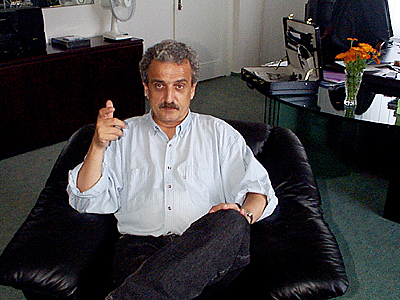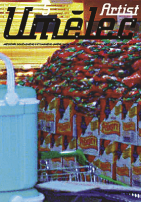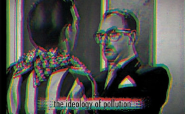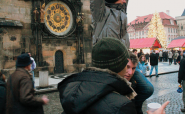| Revista Umělec 1998/5 >> Interview with the new Minister of Culture Pavel Dostál | Lista de todas las ediciones | ||||||||||||
|
|||||||||||||
Interview with the new Minister of Culture Pavel DostálRevista Umělec 1998/501.05.1998 Lenka Lindaurová | q&a | en cs |
|||||||||||||
|
Pavel Dostál is the first socialist Czech Minister of Culture. He was appointed to his post at the end of July 1998, following an uninterrupted session of right-wing ministers.
What do you understand by cultural policy and what type of cultural policy are you going to push forth? Each ministry practices its own policy. The Ministry of Social Affairs cannot work without its social policy, just as the Ministry of Industry cannot work without its own industrial policy, etc. Hence, cultural policy is nothing but an elementary step towards a state of affairs in which state institutions formulate their relationships to culture and form their approaches to responsibility and public awareness. I do not single out state cultural institutions. Last but not least, cultural policy is also about money. To me, culture is a basic human and social dimension that integrates a human being into society. I want to advocate a cultural policy that will enable Czech culture to be a free, democratic culture, of course, as well as a broad, colorful and multilateral culture. The Ministry should create the conditions for this, naturally within the boundaries of its financial capacity. Are you going to change the current structure of the Ministry and where do you see its role now? In due time, there will be change. But I do not abide by the old saying about the new broom that sweeps well. I do not need to sweep anything. I need to attract people to work with me. I’m convinced that when they realize that their work is meaningful, they will not be put off by the fact that their salaries will be quite laughable. The objective of all structural changes is to create a well-working state office that serves the culture, not a situation that implies that culture only exists because of the Ministry. The Ministry will focus on new legislation on a broad scale, including compatibility with the EU legal system and the creation of a multi-source-funding system. How do you want to induce officers to enjoy their work or change their attitudes toward their responsibilities? I want to motivate them so that they feel they are part of something that has meaning and that their opinions and initiatives are welcome and listened to. Perhaps I may look like a sad knight attacking a windmill but it is not an attack, the point is to get the mill turning. Having spent a week in the office, I found out that the people were not motivated at all. They have to feel that the work they have been motivated towards has concrete results. The Ministry has to manage this and then people will behave differently. What laws will the Ministry propose first and why? We will propose a press law and an intellectual property (authorship) law. The absence of both is obvious. What do you think of the problems the Modern and Contemporary Art Collection of the National Gallery is experiencing? Should the collection be awarded autonomy within the National Gallery and should it perhaps be moved to more suitable space? And who should be the director of Veletržní palác? There are several solutions, ranging in the Modern and Contemporary Art Collection possessing a certain degree of autonomy to moving it to a suitable space more attractive to tourists and finding a person who will be able to make it more lively. In this respect, I am one big ear and I don’t intend to speak faster than I think. I won’t reject any cooperation. I’m not a person who remains hurt in his soul for the rest of his life because somebody has publicly questioned his abilities to be a Minister of Culture. The world is not pushed forward by faith but doubts. Anyway, one can assume that any solution will be questioned by this or that part of art community. But I have to take this risk. That’s why I’m a Minister. Have you met with the representatives of the National Gallery yet? Before I was appointed Minister, I met with [the National Gallery director] Zlatohlávek, who explained his view of the problems, and with [former Modern and Contemporary Art Collection director] Anděl, who explained the other side of the story. I asked the Ministry to show me the report of the Internal Audit Committee. Mr. Anděl is wrong is his reaction to his dismissal. The problem is that the internal flow of money [at the National Gallery] is still following real socialist guidelines. Nearly nothing has changed during the past eight years [since the Velvet Revolution]. My political role is to try to convince the Finance Minister to wipe this idiocy out of the world. There is proof that private projects work better because they can freely use their financial resources. Do you think then that financial autonomy is necessary for the Modern Collection? I’m going to face one elementary decision: I will do whatever possible to ensure at least financial autonomy for Veletržní palác. This will demand a brave decision. What do you think of exhibiting modern collections in other spaces? There are some solutions that should be discussed. The Czech Museum of Art is moving out of Husova Street and the House of the Black Madonna. The question is whether the collection should be moved from Veletržní palác to these two buildings and free Veletržní palác to achieve its original purpose – leasing commercial space. Money made this way would then go to cultural funding. I intend to start up a debate on this issue as soon as I get an idea of the situation. I will then meet with the National Gallery director and his opponents. I will need analyses, arguments, questioning of opinions. With the help of the media, the debate may become a matter of public interest. Mere discussion will not help here. Are you considering replacing the National Gallery management? Concerning [NG director] Zlatohlávek, I do not want to make rushed decisions. However, I’ve arrived to one conclusion: directorship positions in such cultural institutions will be selected in public competitions every four years. A director who has an indefinite term is bound to suffer from burnout. What do you think is the reason that the public response to contemporary art is at such a low level, and what can be done to improve communication? We live in a strange world of broken values. In saying this, I am not attacking those other values. I’m not panicking either. People are finding their ways back to cinemas, theaters and galleries. Recently, I went to see the last Jan Saudek exhibition, and he cannot complain of a lack of public interest to his work. I can say the same about the exhibitions at the Rudolfinum Gallery. We can expect that the forthcoming Josef Lada exhibition in the Prague Castle’s Riding Hall will be a major success. My God, how come they don’t have ideas like this in the National Gallery? Isn’t Lada a national artist? Isn’t he modern? This is not criticism, just a slight sigh.
01.05.1998
Artículos recomendados
|
|||||||||||||







Comentarios
Actualmente no hay comentariosAgregar nuevo comentario